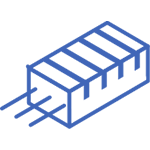

Infineon Technologies TLE5109A16DE1210XUMA1
Manufacturer No:
TLE5109A16DE1210XUMA1
Tiny WHSLManufacturer:
Utmel No:
1211-TLE5109A16DE1210XUMA1
Package:
16-TSSOP (0.154, 3.90mm Width)
Datasheet:
Usage Grade:
 Automotive
Automotive
Description:
Automotive, AEC-Q100 Series For Measuring Angle Gull Wing External Magnet, Not Included Analog Voltage 3.3V ±0.1° 0° ~ 180° Cosine, Sine 16-TSSOP (0.154, 3.90mm Width)
Quantity:
Unit Price: $3.663903
Ext Price: $3.66
Delivery:





Payment:











In Stock : Please Inquire
Minimum: 1 Multiples: 1
Qty
Unit Price
Ext Price
1
$3.663903
$3.66
10
$3.456512
$34.57
100
$3.260861
$326.09
500
$3.076284
$1,538.14
1000
$2.902154
$2,902.15
Want a lower wholesale price? Please send RFQ, we will respond immediately.
RFQ Now
Add to RFQ list
You may place an order without registering to Utmel.
We strongly suggest you sign in before purchasing as you can track your order in real time.
For your convenience, we accept multiple payment methods in USD, including PayPal, Credit Card, and wire transfer.
RFQ (Request for Quotations)It is recommended to request for quotations to get the latest prices and inventories about the part.
Our sales will reply to your request by email within 24 hours.
1. You'll receive an order information email in your inbox. (Please remember to check the spam folder if you didn't hear from us).
2. Since inventories and prices may fluctuate to some extent, the sales manager is going to reconfirm the order and let you know if there are any updates.
- TypeParameter
- Factory Lead Time39 Weeks
- Mounting Type
The "Mounting Type" in electronic components refers to the method used to attach or connect a component to a circuit board or other substrate, such as through-hole, surface-mount, or panel mount.
Surface Mount - Package / Case
refers to the protective housing that encases an electronic component, providing mechanical support, electrical connections, and thermal management.
16-TSSOP (0.154, 3.90mm Width) - Usage LevelAutomotive grade
- Packaging
Semiconductor package is a carrier / shell used to contain and cover one or more semiconductor components or integrated circuits. The material of the shell can be metal, plastic, glass or ceramic.
Tape & Reel (TR) - Series
In electronic components, the "Series" refers to a group of products that share similar characteristics, designs, or functionalities, often produced by the same manufacturer. These components within a series typically have common specifications but may vary in terms of voltage, power, or packaging to meet different application needs. The series name helps identify and differentiate between various product lines within a manufacturer's catalog.
Automotive, AEC-Q100 - Part Status
Parts can have many statuses as they progress through the configuration, analysis, review, and approval stages.
Active - Moisture Sensitivity Level (MSL)
Moisture Sensitivity Level (MSL) is a standardized rating that indicates the susceptibility of electronic components, particularly semiconductors, to moisture-induced damage during storage and the soldering process, defining the allowable exposure time to ambient conditions before they require special handling or baking to prevent failures
3 (168 Hours) - Voltage - Supply
Voltage - Supply refers to the range of voltage levels that an electronic component or circuit is designed to operate with. It indicates the minimum and maximum supply voltage that can be applied for the device to function properly. Providing supply voltages outside this range can lead to malfunction, damage, or reduced performance. This parameter is critical for ensuring compatibility between different components in a circuit.
3.3V - Output
In electronic components, the parameter "Output" typically refers to the signal or data that is produced by the component and sent to another part of the circuit or system. The output can be in the form of voltage, current, frequency, or any other measurable quantity depending on the specific component. The output of a component is often crucial in determining its functionality and how it interacts with other components in the circuit. Understanding the output characteristics of electronic components is essential for designing and troubleshooting electronic circuits effectively.
Analog Voltage - Termination Style
"Termination style" in electronic components refers to the method used to connect the component to a circuit board or other electronic devices. It determines how the component's leads or terminals are designed for soldering or mounting onto the circuit board. Common termination styles include through-hole, surface mount, and wire lead terminations.Through-hole components have leads that are inserted through holes in the circuit board and soldered on the other side. Surface mount components have flat terminals that are soldered directly onto the surface of the circuit board. Wire lead terminations involve attaching wires to the component for connection.The choice of termination style depends on factors such as the type of component, the manufacturing process, and the space available on the circuit board. Different termination styles offer various advantages in terms of ease of assembly, reliability, and space efficiency in electronic designs.
Gull Wing - Actuator Type
The actuator type in electronic components refers to the specific mechanism or technology used to convert electrical energy into physical motion or action. Common actuator types include electric motors, solenoids, piezoelectric actuators, and hydraulic or pneumatic cylinders. Each type has its unique characteristics, advantages, and applications, allowing them to be utilized in diverse systems such as robotics, automation, and control processes. The choice of actuator type often influences the performance, efficiency, and functionality of the overall system.
External Magnet, Not Included - Linearity
In electronic components, linearity refers to the relationship between the input and output signals of the component. A component is said to be linear if its output is directly proportional to its input over a specified range. In other words, when the input signal changes, the output signal changes in a consistent and predictable manner without introducing distortion or non-linear effects.Linearity is an important parameter in electronic components such as amplifiers, filters, and sensors, as it determines the accuracy and fidelity of signal processing. Non-linearities in components can lead to signal distortion, harmonic generation, and other undesirable effects that can degrade the performance of electronic systems.Engineers often characterize the linearity of components by measuring parameters such as gain error, harmonic distortion, and intermodulation distortion. By ensuring that components exhibit good linearity characteristics, designers can create electronic systems that accurately process signals and faithfully reproduce the desired output.
±0.1° - For Measuring
The parameter "For Measuring" in electronic components refers to the specific characteristics or properties of the component that can be measured to determine its performance, functionality, or quality. These parameters are essential for evaluating the behavior of the component in a circuit and ensuring that it meets the required specifications.Common parameters for measuring electronic components include resistance, capacitance, inductance, voltage, current, frequency, temperature coefficient, and power rating. These measurements help engineers and technicians understand how the component will interact with other elements in a circuit and whether it will perform as expected.Accurate measurement of these parameters is crucial for designing and troubleshooting electronic circuits, as deviations from the specified values can lead to malfunctions or failures. Various testing equipment such as multimeters, oscilloscopes, and signal generators are used to measure these parameters accurately.
Angle - Output Signal
signal that comes out of an electronic system. output. signal, signaling, sign - any nonverbal action or gesture that encodes a message; "signals from the boat suddenly stopped" printout - the output of a computer in printed form.
Cosine, Sine - Rotation Angle - Electrical, Mechanical
The parameter "Rotation Angle - Electrical, Mechanical" in electronic components refers to the maximum angle through which a component can be rotated during installation or operation without causing any damage or affecting its performance. This parameter is important for components such as potentiometers, switches, connectors, and other devices that may need to be rotated for adjustment or positioning purposes. The electrical rotation angle specifies the maximum angle at which the electrical connections can be rotated without causing any electrical issues, while the mechanical rotation angle refers to the maximum physical rotation that the component can withstand without breaking or malfunctioning. It is crucial to adhere to the specified rotation angles to ensure the proper functioning and longevity of the electronic component.
0° ~ 180° - RoHS Status
RoHS means “Restriction of Certain Hazardous Substances” in the “Hazardous Substances Directive” in electrical and electronic equipment.
ROHS3 Compliant
![TLE5012BE1000XUMA1]()
TLE5012BE1000XUMA1
Infineon Technologies![TLV493DA1B6HTSA2]()
TLV493DA1B6HTSA2
Infineon Technologies![TLE5012BDE1200XUMA1]()
TLE5012BDE1200XUMA1
Infineon Technologies![TLE5012BE3005XUMA1]()
TLE5012BE3005XUMA1
Infineon Technologies![TLI5012BE1000XUMA1]()
TLI5012BE1000XUMA1
Infineon Technologies![TLE5012BDE9200XUMA1]()
TLE5012BDE9200XUMA1
Infineon Technologies![TLE5012BE5000XUMA1]()
TLE5012BE5000XUMA1
Infineon Technologies![TLE5009E2010FUMA1]()
TLE5009E2010FUMA1
Infineon Technologies![TLE5009E1000FUMA1]()
TLE5009E1000FUMA1
Infineon Technologies![TLE5012BE5020XUMA1]()
TLE5012BE5020XUMA1
Infineon Technologies

















 Military
Military  Aerospace
Aerospace  Industrial
Industrial  Commercial
Commercial 















